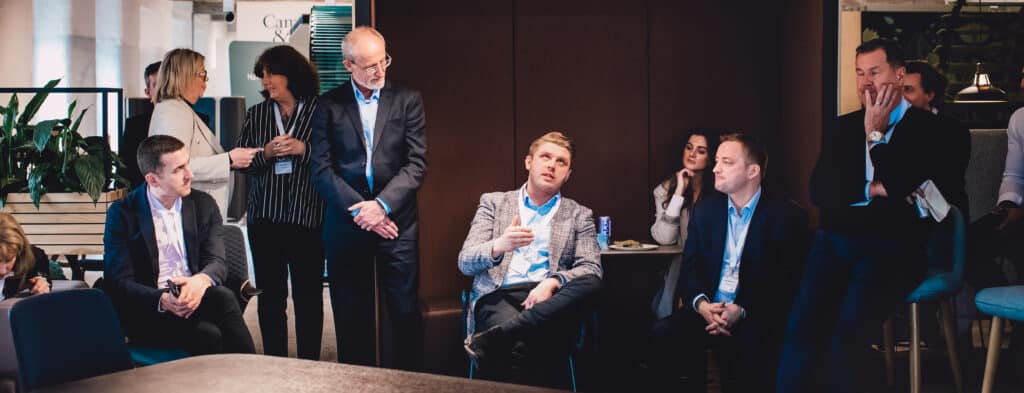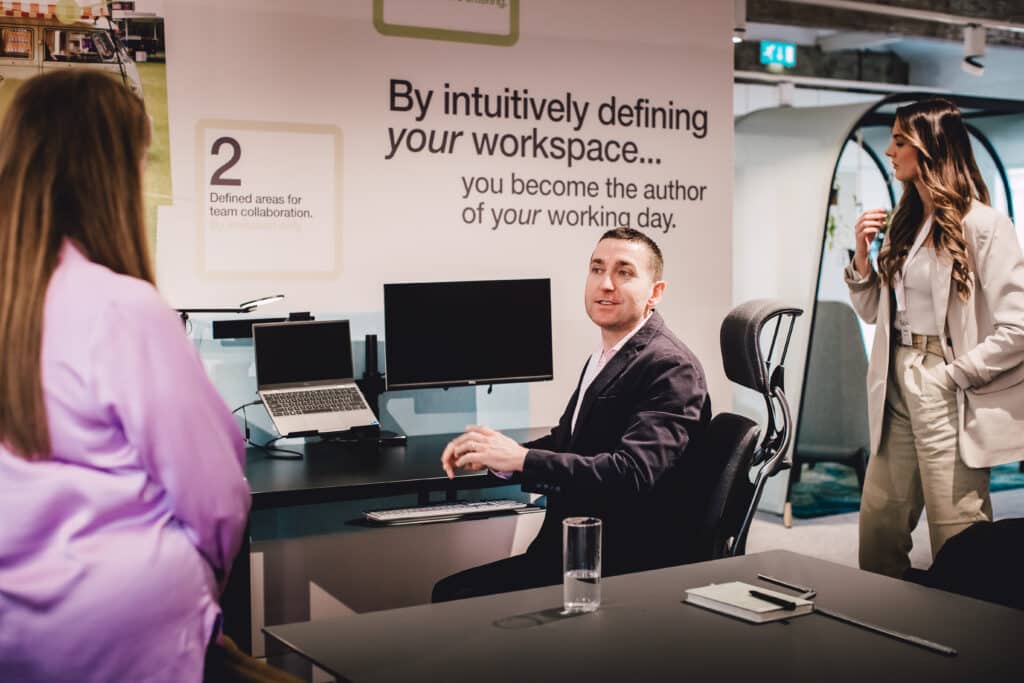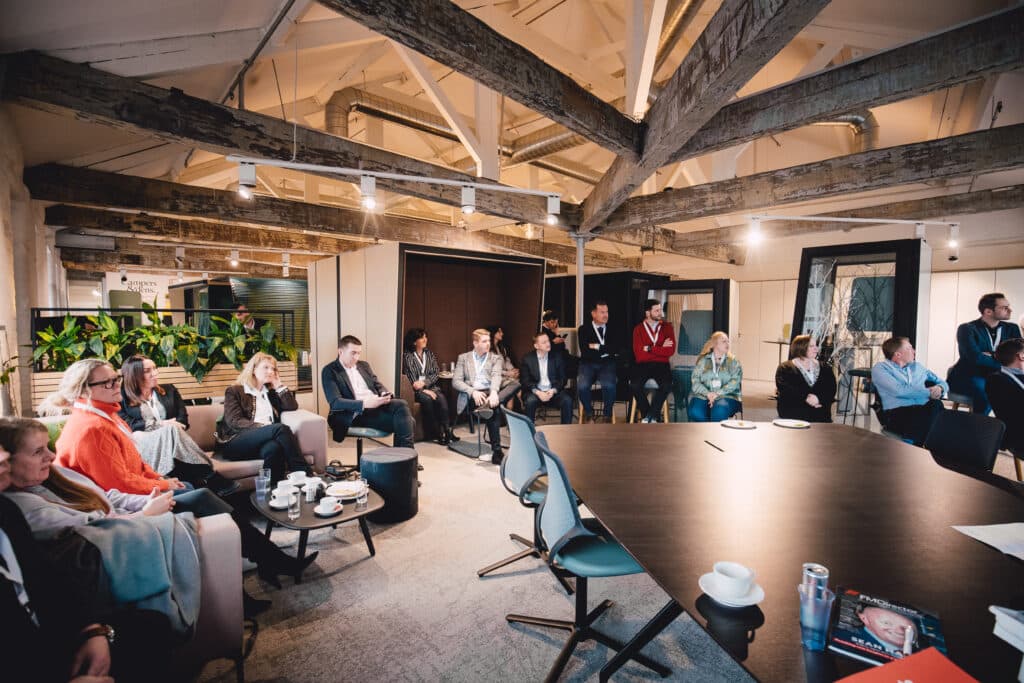Discussing the challenges and advantages of developing best practice modern working processes within the latest FM Business Daily roundtable event, sponsored by D3 Office Group.
While the effect of the Coronavirus pandemic continues to be felt by numerous areas of UK society and many areas of the business community, it has also been described as a driver of new working practices.
One of the areas of most note has been the dramatic shift in working arrangements, which has led to many companies implementing agile working processes within their company. While this has helped most businesses initially, a large percentage are now having to adjust these in an effort to see offices achieve higher levels of attendance.
Having appreciated the wider view of agile working, FM Director and D3 Office Group invited a select group of industry experts to the company’s Huddersfield, West Yorkshire showroom and office to discuss the issue in more depth. Those attending were welcomed with refreshments and tours of the facility, combined with introductions to industry partners of the sponsor, including Orangebox, Humanscale and Your Workspace.
Having assembled a mix of client-side FMs, real estate, office and procurement managers and directors, combined with service providers involved in relevant areas of the FM sector, conversations ranged from forthcoming construction and redesign projects to the upgrading of existing office furniture and equipment.
Following an early lunch, the more formal side of the day was initiated by Orangebox research and insight manager Nathan Hurley with an in-depth presentation that included a number of contrasting views from higher education and business leaders. Possibly the most notable of these was the statistic that the large majority (96%) of higher education chief academics claimed to be preparing students for the work environment in an effective manner, but a mere 11% of business leaders agreed with this statement.
Having gained the undivided attention of the attendees, Mr Hurley continued his presentation with an entertaining variety of results from his studies and conversations with both academics and employers. One of his main areas of focus was the comparison between the modern higher education campus and the workplace, particularly relating to the use of devices and application of technology.
With a number of attendees stating how their workplace had changed since the pandemic, or was due to do so, it was stated that the same was true for campuses in meeting the expectations of students. The majority of students (91%) would typically arrive at university with two electronic devices, with more than half of all new cohorts arriving with three.

This is another area matched with the workplace, leading to discussion on how to accommodate all members of the workforce and their methods of working. The use of personal electronic devices is continuing to drive the need for improved levels of connectedness to company systems and allowing all employees to remain as productive as possible, regardless of whether they work at the main office or satellite facilities, at their homes or other buildings, including those of clients or industry partners.
Mr Hurley additionally discussed the emergence of activity based learning within higher education facilities, which continued to match developments within many company workplaces. As a result of this, students are able to access areas for individual studies, along with others for teams and groups of all sizes.
These areas are designed to encourage and meet the aspirations of those requiring higher levels of social interaction, combined with amenities for digital learning, along with catering, more formal presentations or more privacy for those seeking spaces to facilitate peace and quiet.
One of the most notable results of these developments has been a dramatic change to the interior design of many universities and colleges around the UK. This was illustrated within Mr Hurley’s presentation, with a number of examples of higher education interiors that resembled the interiors of modern workplaces.
Taking the above into account, Mr Hurley introduced the concept of Relationship Buildings, which has been formed by his company to assist in navigating, interpreting and re-imaging the changing landscape of the workplace in the light of the continuing impact of the Coronavirus pandemic. This provided further cohesion between the day’s activities and the discussion on the topic of agile working.
Attendees agreed with the majority of points made within the presentation about the significant changes that had resulted from measures introduced to deal with the pandemic, which has been described as compressing the movement toward agile working into a few months that would otherwise have taken 10 years.

Having brought the issues that continue to be experienced by many businesses into sharp perspective, the continuing discussion further emphasised the issues experienced and their ongoing impact on the workplace. The large scale and sudden shift in working practices saw large numbers of UK workers begin to work from home at short notice as companies complied with the first lockdown in early 2020, with many yet to return to full time office work.
One result of this has seen employers use a variety of means to encourage higher numbers of staff to use their offices on a more frequent basis. Having implemented agile working practices to allow employees to have greater variety, attendees to the D3 Office Supplies event reported that these were continuing to be reviewed and adjusted.
One of the trends discussed was that of redesigning workplaces to make them more attractive to all members of staff, often combined with reducing the amount of floorspace to reflect the lower number of people in attendance compared with the footfall seen prior to the pandemic. Questions were additionally asked about how this has and would continue to impact the real estate sector.
Lower demand for office space is continuing to cause concern among property owners, with the implication that new construction projects are likely to be designed to appeal to more buoyant sectors. However, with many individuals and businesses struggling to cope with the high levels of inflation and other issues seen over the last 18 months, questions were asked over the long term effects these would have on the real estate sector.
The individual concerns of those in attendance were also shared, along with the issues that they had seen in both their own offices and those of their clients. With companies seeking to manage their offices more efficiently, many had turned to technology to assist with this.
Systems to monitor the use of space had been deployed, with the intention to record whether the various areas within offices were being used sufficiently. The resulting data could be used to justify further changes, including reductions and increases to the space.
Following the event, numerous examples of positive feedback were shared for the opportunities provided throughout the day. In addition to networking with peers and discussing each other’s requirements and approach to agile working, the opportunity to view the many products on show and see live demonstrations of their use was also well received.

Anabas business development director Simon Whitehead replied to FM Director after the event to confirm “we firmly believe that agile working is here to stay – and the onus is currently on employers to create a reason for their people to come to the workplace.
“The workplace experience therefore must be of the highest quality and worth the price of the commute. We are working closely with our current clients the help them with this, along with demonstrating to prospective new ones how we can add value and help them. It will be a key factor in the attraction and retention of quality people,” said Mr Whitehead.
Sodexo supply chain consultant Ross Martland said: “Agile working and a new hybrid approach to workspace is providing one of the greatest challenges for our clients, particularly in attracting and retaining talent after an unprecedented few years.
“It feels relatively early to conclude on the impact of any new approach to workplace environment. The outcomes for productivity and employee well-being on designing more collaborative and relaxed space, compared with more traditional desking and space for privacy and focus are yet to be seen through the analytics but, without doubt, it will be essential for employee recruitment and retention and is certainly what clients will want and need in the future.”
Mr Martland believes it would be beneficial to discuss how further and higher education spaces have delivered on the expectations of the next generation, as their needs will be very different and workspaces will need to adapt accordingly.
Possibly the most immediate challenge is how workplaces work to avoid lack of attendance on Mondays and Fridays, requiring more thought on “how best to manage the space, the cost and the more macro estate impacts of a changing world”.




